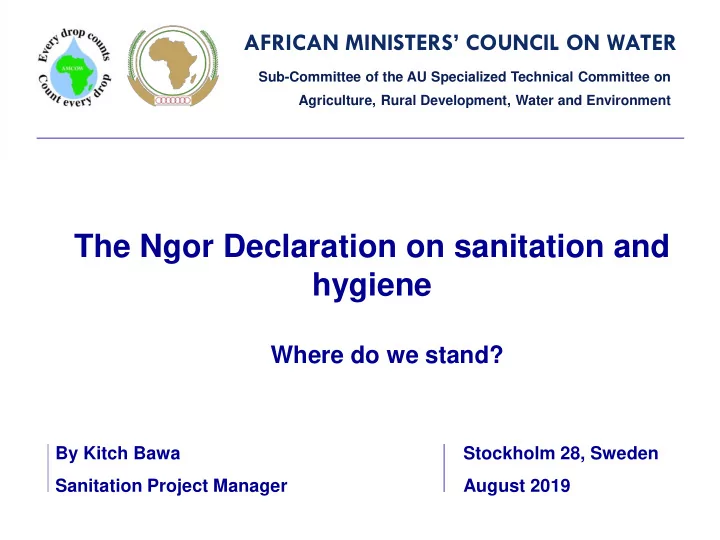

AFRICAN MINISTERS’ COUNCIL ON WATER Sub-Committee of the AU Specialized Technical Committee on Agriculture, Rural Development, Water and Environment The Ngor Declaration on sanitation and hygiene Where do we stand? By Kitch Bawa Stockholm 28, Sweden Sanitation Project Manager August 2019
Monitoring the Ngor Declaration “Recognising that the time has come to incorporate lessons from the eThekwini commitments”… ”setting out in particular clear indicators for the monitoring process” ▪ The Ngor Declaration on Sanitation and Hygiene
Sub-Committees SCML Workplan Monitoring and 2017-2019 1. Develop a harmonized Learning framework for Ngor and SDG reporting with indicators disaggregated by gender, age and Rural Sanitation Rural Sanitation physical condition. AfricaSan AfricaSan 2. Support AMCOW to develop the International International capacity of the member states to Taskforce Taskforce report in Pan African system Urban Urban Sanitation Sanitation 3. Establish a baseline for Ngor indicators and integrate priorities into national and sub- AfricaSan national planning processes AfricaSan Processes Processes 4. Showcase evidence based reports to improve learning and to mobilise resources
Ngor monitoring indicators ▪ 10 Ngor commitments: 42 indicators ▪ Indicators for Ngor commitments monitoring are staged to show progressive realisation of each commitment Stage 2 Vision Stage 1 indicators indicators indicators track track track the achievement of outcomes enabling published - access environment country targets . and use
5 Results- enabling environment Across Africa there has been good progress against the commitment to establish leadership and coordination structures. This is a key area which drives progress in the sector
6 Results- enabling environment The commitment to eliminate inequalities in access and use, remains a critical bottleneck which threatens to undermine progress across Africa. The commitment to establish budgets for sanitation and hygiene continues to lag behind. Financing is necessary for enabling and accelerating progress to SDG 6 in Africa.
7 Results- enabling environment Eliminating untreated waste, and encouraging its productive utilization is currently the worst performing of the Ngor commitments.
8 Results – country targets ▪ For most commitments less than half of countries have made sufficient progress in establishing the enabling environment, to be able to monitor progress against country targets. ▪ This pattern will change in the future as countries strengthen the enabling environment, and targets and tracking systems against which to measure progress are established.
9 The Ngor vision “The Ngor Vision is to achieve universal access to adequate and sustainable sanitation and hygiene services and eliminate open defecation by 2030”.
10 Basic sanitation Proportion of the population using at least basic sanitation, 2015 In most African countries less than half of people use at least basic sanitation. <50% 50-75% 76-90% 91-100% No data Source: JMP, 2017
Open defecation remains high across Sub-Saharan Africa Rural sanitation access Urban sanitation access 100% 100% 80% 80% 60% 60% Predominantly a rural issue: In 14 countries in Sub- 40% 40% Saharan Africa more than half 20% 20% of the rural population practise open defecation 0% 0% North Africa Southern West Africa Eastern Central North Africa Southern West Africa Eastern Central Africa Africa Africa Africa Africa Africa At least basic Limited (shared) Unimproved Open defecation At least basic Limited (shared) Unimproved Open defecation
12 Hygiene Proportion of the population with handwashing facilities including soap and water, 2015 In most African countries less than 50% of the population have basic handwashing with soap facilities at home. Note: Data to monitor hygiene is available for only 37 countries. <50% 50-75% 76-90% 91-100% Source: JMP, 2017 No data
Country dialogue : New learning leading to review national action plan and prioritization of actions African Ministers’ Council on Water A sub-committee of the African Union specialized technical committee on Agriculture, Rural Development, Water and Environment.
Multistakeholders statement to support the Ngor Declaration ➢ 4 participatory dialogues: • Private Sector • Local authorities • Civil society • Development Partners One Statement : “ Camissa Multi-Stakeholder Statement on Achieving Access to Adequate and Equitable Sanitation and Hygiene for All and Ending Open Defecation in Africa by 2030” African Ministers’ Council on Water A sub-committee of the African Union specialized technical committee on Agriculture, Rural Development, Water and Environment.
Thank you Merci Obrigado www.amcow-online.org @amcowafrica
Recommend
More recommend